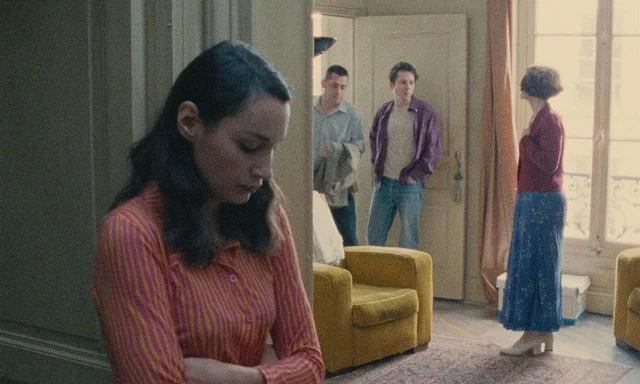 |
| Vicky Krieps in Hold Me Tight |
Cast: Vicky Krieps, Arieh Worthalter, Anne-Sophie Bowen-Chatet, Sacha Ardilly, Juliette Benveniste, Aurèle Grzesik, Aurélia Petit, Erwan Ribard, Cuca Bañeras Flos, Samuel Mathieu, Jean-Philippe Petit. Screenplay: Mathieu Amalric, based on a play by Claudine Galea. Cinematography: Christophe Beaucarne. Production design: Laurent Baude. Film editing: François Gédigier.
"I don't like movies that make me think," said a woman on a social media site recently in an argument about Kathryn Bigelow's latest film, A House of Dynamite. "I have enough to think about already." I wouldn't recommend Mathieu Amalric's Hold Me Tight to her, then. It makes the viewer work to sort out what is going on in actuality or in the mind of the protagonist, Clarisse (Vicky Krieps). When we first see her, she is laying out a bunch of Polaroid photographs on the table, turning them over as if they were tarot cards that might provide a revelation of some sorts. Then we see her sneak out of the house, careful not to wake her husband and children, and set out on what will become a solitary road trip. We then see her family, her husband, Marc (Arieh Worthalter), her daughter, Lucie (Anne-Sophie Bowen-Chatet), and her son, Paul (Sacha Ardilly), as they start the day without her. But gradually we realize that what we have just seen may not have happened at all, at least not in the way it's presented to us, and we have to assemble what is being shown to us into a coherent and ultimately painful reality. The question may arise whether the way Amalric chooses to tell Clarisse's story justifies itself: Does it reveal something about her experience that a straightforward narrative would lack? Or is it just like a jigsaw puzzle in which putting it together is the point, rather than the picture itself? After waffling back and forth between those questions, I find myself coming down mushily in the middle: I think the complications of the narrative verge on self-conscious filmmaking, but that the ultimate effect is to make Hold Me Tight an unusually compelling story of memory and desire, heightened by Krieps's performance and a soundtrack full of evocative music.



























